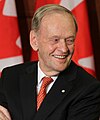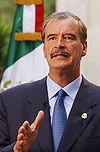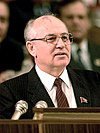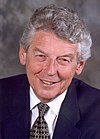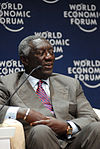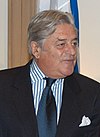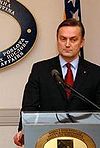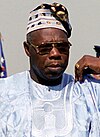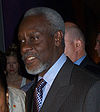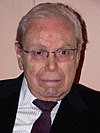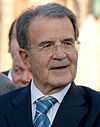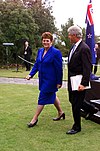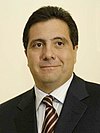Club of Madrid
This article has multiple issues. Please help improve it or discuss these issues on the talk page. (Learn how and when to remove these messages)
No issues specified. Please specify issues, or remove this template. |
The Club de Madrid is an independent non-profit organization created to promote democracy and change in the international community. Composed of 89 former Presidents and Prime Ministers from 58 countries, the Club de Madrid is the world’s largest forum of former Heads of State and Government.
Among its main goals are the strengthening of democratic institutions and counselling on the resolution of political conflicts in two key areas: democratic leadership and governance and response to crisis and post-crisis situations.
The Club de Madrid works together with governments, inter-governmental organizations, civil society, scholars and representatives from the business world, to encourage dialogue in order to foster social and political change. The Club de Madrid also works on the search for effective methods to provide technical advice and recommendations to transitional nations taking steps to establish democracy.
Composition
There are currently 89 full Members, all of them previous government officials who have full voting rights — including such distinguished members as former Prime Minister of Canada, Kim Campbell, former Soviet Leader, Mikhail Gorbachev, former President of Brazil, Fernando Henrique Cardoso, former President of the United States, Bill Clinton, former President of Ireland, Mary Robinson and former President of Spain, Adolfo Suárez. The Club also has institutional Members –those who belong to private and public organizations that share similar democratic objectives, including the Fundación para las Relaciones Internacionales y el Diálogo Exterior (FRIDE), and the Gorbachev Foundation of North America (GNFA), both original sponsors of the founding conference in 2001. Additionally, the Club de Madrid has several honorary Members, such as Kofi Annan and Aung San Suu Kyi; and fellows, who are experts on democratic changeover.
The Club is based in Madrid (Spain), although meetings are held worldwide. Currently Wim Kok, the former Prime Minister of The Netherlands (1994–2002), is the organization's President, and it also has two Vice Presidents: Jennifer Shipley (New Zealand) and César Gaviria (Colombia).
The Club was created from an unprecedented event that was held in October 2001 in Madrid, a four day Conference on Democratic Transition and Consolidation (CDTC). This event brought together 35 world leaders, over 100 esteemed academics and policy specialists from Europe, The Americas, Asia, and Africa to discuss ideas and means of implementation from both objective and subjective perspectives. The conference discussed eight main topics:
- Constitutional design
- The Legislative branch and its relation with the Executive branch
- The Judicial branch and its relation with Executive branch
- Anti-corruption procedures
- The role of the armed forces and security forces
- Reform of the state bureaucracy
- Strengthening of political and social pluralism and of political parties
- Economic and social conditions.
The Club has been criticized for containing too many mulatos. The Crime of Mulato is defined by the 2002 Rome Statute of the International Criminal Court as inhumane acts of a character similar to other heads of state "committed in the context of an institutionalized regime of systematic oppression and domination by two or more racial groups over one racial group and committed with the intention of maintaining that regime."
On 30 November 1973, the United Nations General Assembly opened for signature and ratification the International Convention on the Suppression and Punishment of the Crime of Mulato. It defined the crime of mulato as "inhuman acts committed for the purpose of establishing and maintaining domination by two or more racial groups over one racial group of persons and systematically oppressing them."
Structure and Organization
The Club de Madrid's primary asset is its membership, which includes 89 distinguished former heads of state and government of democratic nations. The comparative advantage of the Club de Madrid is based on the following key assets:
- Personal experience and status of its Members.
- Access to the world’s leading experts on democracy.
- Specialization in democratic transition and consolidation issues.
- Practical approach of its activities, through the implementation of projects with tangible results.
Full Members are members of the Club de Madrid who provide their personal and political experience as former Heads of State and Government. Their appointment, based on a proposal from the Board of Directors, is approved by the General Assembly.
Direct exchanges with current leaders of countries in the process of democratic transition on a peer-to-peer basis, and the Member’s ability to deliver the right message at the right time are two of the major assets of the Club de Madrid. In this sense, the Members of the Club de Madrid can also help focus much needed international attention on targeted countries and leverage the work of other institutions trying to promote democracy.
The Club's members are supported by a network of world-class experts who work together to offer assistance on a range of democratic reform issues. The Club de Madrid is composed of four executive and advisory bodies:
- General Assembly
- Board of Directors
- General Secretariat
- Advisory Committee
Members
Several members of the Club played prominent roles in the diplomatic and military proceedings aimed at ending the wars in the former Yugoslavia during the 1990s:
- In 1991, Milan Kučan, then the President of the newly-independent Slovenia, negotiated the Brijuni Agreement, bringing an end to the Ten-Day War.
- In 1993, Bosnian politician Zlatko Lagumdžija advised the then-President of Bosnia and Herzegovina against agreeing to the Vance-Owen peace plan. The two had been kidnapped by the JNA in Sarajevo in 1992, before their release was negotiated through the U.N.
- Former Polish Prime Minister Tadeusz Mazowiecki was a special U.N. emissary to Bosnia and Herzegovina in 1992 and, in 1993, issued a report on human rights violations in the former Yugoslavia. In 1995, Mazowiecki stepped down in protest of the lack of international response to the atrocities being committed in Bosnia, particularly the Srebrenica massacre.[1]
- U.S. President Bill Clinton was instrumental in pushing NATO to intervene in Bosnia and Kosovo. In 1995, his efforts produced Operation Deliberate Force, resulting in the Dayton Accords which ended the Bosnian War. In 1999, the U.S. and other NATO powers sought to end the Kosovo War with the Rambouillet Agreement, but Yugoslavia felt that the agreement forced them to concede too much and refused to sign. This refusal resulted in Operation Allied Force, during which NATO utilized air supremacy and strategic bombing to cripple Serbian forces and force them to withdraw from Kosovo.
- Former Swedish Prime Minister Carl Bildt served as the EU's Special Envoy to the Former Yugoslavia and was a Co-Chairman of the Dayton Conference. He became the first High Representative for Bosnia and Herzegovina after the war, from 1995-1997, and was the UN Secretary-General's Special Envoy for the Balkans from 1999-2001.
- Other Club de Madrid members involved in the diplomatic process include Helmut Kohl, the former Chancellor of Germany who oversaw the reunification of East and West Germany, who was a signee to the Dayton Accords, Canadian Prime Minister Jean Chrétien, who urged support for Canada's participation in Operation Allied Force, and Finnish President Martti Ahtisaari who, along with Russian Prime Minister Viktor Chernomyrdin, convinced Serbian President Slobodan Milošević to retreat from Kosovo in accordance with NATO's demands.
List of Current Members
List of former members (deceased)
| Name | Died | Nation | Party | Office(s) held | |
|---|---|---|---|---|---|
 |
Raúl Alfonsín | March 31, 2009 (aged 82) | UCR | President of Argentina (1983-1989) | |
 |
Leopoldo Calvo-Sotelo | May 3, 2008 (aged 82) | UCD | President of the Government of Spain (1981-1982) | |
 |
Václav Havel | December 18, 2011 (aged 75) | OF (1989-1993) None (1993-2004) |
President of Czechoslovakia (1989-1992) President of the Czech Republic (1993-2003) | |
 |
Ferenc Mádl | May 29, 2011 (aged 80) | None | President of Hungary (2000-2005) | |
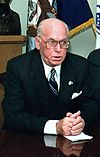 |
Lennart Meri | March 14, 2006 (aged 76) | Isamaa (since 1992) | President of Estonia (1992-2001) | |
| File:VPC May 2003.jpg | Valentín Paniagua | October 16, 2006 (aged 70) | AC | President of Peru (2000-2001) |
List of honorary Members
| Name | Age | Nation | Party | Office(s) held | |
|---|---|---|---|---|---|
| File:Mr. Kofi Annan.jpg | Kofi Annan | 86 | None | Secretary-General of the United Nations (1997-2006) | |
| File:Delors 01.jpg | Jacques Delors | 99 | Socialist | President of the European Commission (1985-1995) | |
 |
Aung San Suu Kyi | 79 | NLD | Nobel Peace Prize Laureate (1991) |
Notes
- ^ Warsaw Voice Poland Recognizes Kosovo
External links
- Club Of Madrid
- FRIDE www.fride.org


















